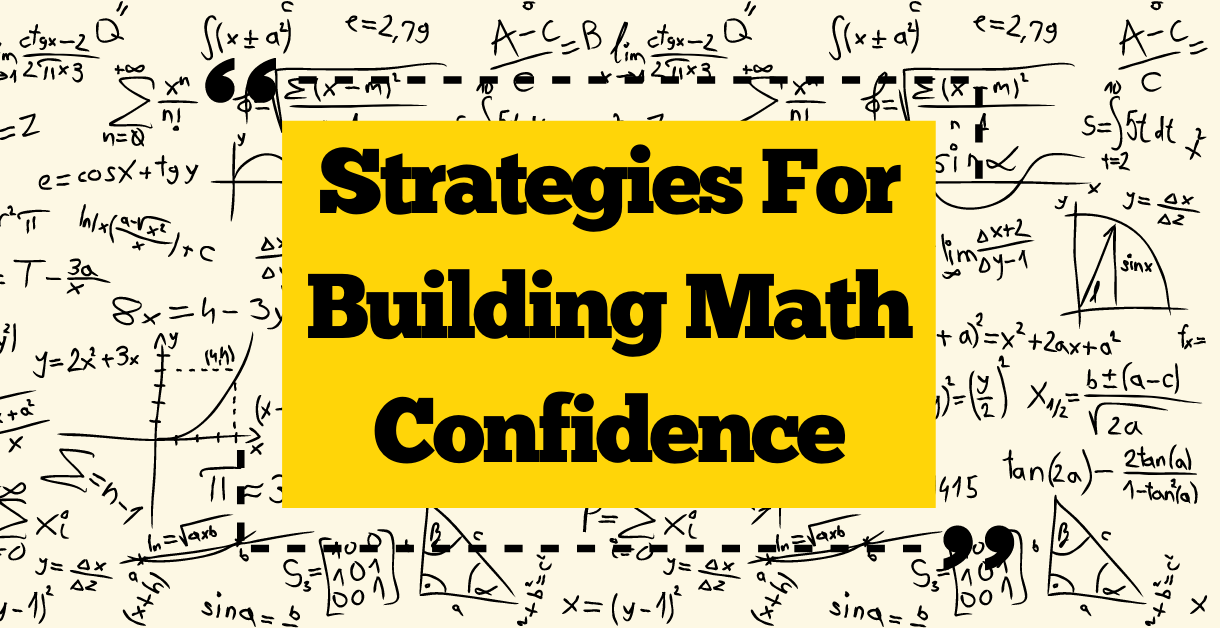Many children develop math anxiety or math phobia, especially if they often struggle with math. They may say “I’m not good at math” which reinforces a lack of confidence in their abilities. Sometimes they pick up negative attitudes about math from people around them who echo this sentiment.
Children who lack confidence in math are generally not motivated to do math, so it is important to build confidence in these learners. As children’s confidence increase, they will begin to trust their abilities and put more effort into learning math.
Speak positively about math Talk about math in a positive way and show children that math is all around them. Point out times when you or the child is using math. This shows them how math applies to daily life and helps them recognize that math is not just something they do for school. Math is integrated into their lives even if they don’t realize it. It might just surprise them to see how much math they use every day and how much math they can already do.
Use the analogy of building a house If children can see math as more than just a bunch of isolated concepts, they begin to realize that concepts they learn earlier contribute to their success in understanding other concepts. Help them understand that math is like building a house. A house needs a foundation before it can have walls, and it needs walls before windows can go in. Similarly, in math, one concept builds on another. Once children understand one concept, it helps them to understand another. For example, once they understand place value, they use it to regroup when adding and subtracting.
Emphasize that success is based on effort If children think they can’t do math, explain that no one is ‘bad at math.’ Success is based on the time and effort they put into learning, not on a natural ability to do math. Build a support system that provides help and encouragement and continually praise the efforts children put into math tasks.
Encourage productive struggle Create a safe environment in which children feel comfortable taking risks and making mistakes. Let them know that mistakes and struggle are a part of the learning process. Mistakes foster new understanding, so encourage children to persevere as they solve math problems and not give up when they hit an obstacle. Remember that Albert Einstein once said, “Anyone who has never made a mistake has never tried anything new.” Allow them to try different strategies and even invent their own to arrive at a solution. It doesn’t matter if they do not arrive at the correct solution on the first try.
Let the child become the teacher Teaching someone else is an effective way to practice a skill and boost confidence. A child can teach another child or sibling a math concept. Teaching a parent can also be a real confidence booster. Many parents learned math in a different way than their children are learning. A child who can teach a parent how to add using partial sums, for example, is not only practicing the concept, but it gives them confidence knowing they are teaching an adult.
Help children have fun with math Many games that children already play are based on math concepts. Emphasize the math in these games. You can also turn learning into a game, so children are learning math even when they don’t realize it.
Confidence in math often translates into other subject areas and other areas in a child’s life. Confident children are self-motivated and willing to take on new challenges. With support and encouragement, your child can develop confidence in math.
![]() We want to thank Athlene from Buzzmath for this week's post.
We want to thank Athlene from Buzzmath for this week's post.
Athlene Whyte is a subject matter expert in mathematics. She is a former educator and school administrator who now writes and edits math content for school publishers.
Buzzmath is a digital interactive program developed by Scolab to build conceptual understanding, procedural fluency, and real-world application in mathematics for grades 1 through 8.
At the Co-op. get exclusive savings HERE on Buzzmath, an educational platform that offers engaging math activities aligned with your curriculum.


